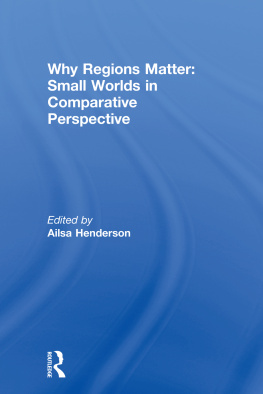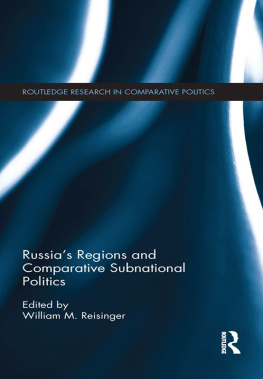Why Regions Matter: Small Worlds in Comparative Perspective
Bringing together experts on regionalism and federalism, this collection explores the impact of legislative regions on parties and voters. It reflects on the 1980 publication of Small Worlds by David Elkins and Richard Simeon, which outlined how and why voters and policies differ across Canadian provinces. Using recent data, the essays in this collection provide a comparative re-examination of the impact of regions.
The book explores attitude divergence in Canada and in the USA, the role and impact of regional parties in Quebec, Scotland and Bavaria, the impact of multi-level governance on how citizens understand and discharge their duties and the capacity of sub-state political systems to influence general political attitudes. The result is an empirical and analytical contribution to regionalism and federalism studies that demonstrates how and why regions matter.
This book was published as a special issue of Regional and Federal Studies .
Ailsa Henderson is Senior Lecturer in the Department of Politics and International Relations, University of Edinburgh. She has published widely on sub state political cultures and elections, and is the author of Hierarchies of Belonging: National Identity and Political Culture in Scotland and Quebec (2007) and Niinavut: Rethinking Political Culture (2007). She currently holds a Marie Curie International Incoming Fellowship to study regional political cultures in Europe.
Why Regions Matter: Small Worlds in Comparative Perspective
Edited by
Ailsa Henderson
First published 2011
by Routledge
2 Park Square, Milton Park, Abingdon, Oxon, OX14 4RN
Simultaneously published in the USA and Canada
by Routledge
711 Third Avenue, New York, NY 10017
Routledge is an imprint of the Taylor & Francis Group, an informa business
2011 Taylor & Francis
This book is a reproduction of Regional and Federal Studies , vol.20, issue 4-5. The Publisher requests to those authors who may be citing this book to state, also, the bibliographical details of the special issue on which the book was based.
All rights reserved. No part of this book may be reprinted or reproduced or utilised in any form or by any electronic, mechanical, or other means, now known or hereafter invented, including photocopying and recording, or in any information storage or retrieval system, without permission in writing from the publishers.
Trademark notice : Product or corporate names may be trademarks or registered trademarks, and are used only for identification and explanation without intent to infringe.
British Library Cataloguing in Publication Data
A catalogue record for this book is available from the British Library
ISBN 13: 978-0-415-66891-0
Typeset in Times New Roman
by Taylor & Francis Books
Disclaimer
The publisher would like to make readers aware that the chapters in this book are referred to as articles as they had been in the special issue. The publisher accepts responsibility for any inconsistencies that may have arisen in the course of preparing this volume for print.
Contents
| Ailsa Henderson |
| Cameron Anderson |
| Ailsa Henderson |
| Fred Cutler |
| Christopher J. Carman & David C. Barker |
| Eve Hepburn |
| Richard Simeon |
Cameron Anderson is Assistant Professor in the Department of Political Science at the University of Western Ontario. His work on elections, voting behaviour and public opinion has appeared in the American Journal of Political Science, Canadian Journal of Political Science , Electoral Studies and Acta Politico. He is also co-editor of a volume entitled Voting Behaviour in Canada (UBC Press, 2011).
David C. Barker is Associate Professor of Political Science at the University of Pittsburgh. His research focuses on the study of public opinion and voting behaviour. Christopher J. Carman and Barker's book 'Conscience and Constituents: Competing Values and the Psychology of Political Representation in America' will be published by Oxford University Press in 2011.
Christopher J. Carman is the John Anderson Senior Research Lecturer in Government at the University of Strathclyde. His research focuses on institutional and behavioural aspects of political representation. Carman and David C. Barker's book 'Conscience and Constituents: Competing Values and the Psychology of Political Representation in America' will be published by Oxford University Press in 2011.
Fred Cutler is Associate Professor of Political Science at the University of British Columbia, Vancouver, British Columbia, Canada. He works on voters' attributions of responsibility in federal states and is a member of the 2010-2015 Canadian Election Study team.
Ailsa Henderson is Senior Lecturer in the Department of Politics and International Relations, University of Edinburgh. She has published widely on sub-state political cultures and elections and is the author of Hierarchies of Belonging: National Identity and Political Culture in Scotland and Quebec (2007) and Nunavut: Rethinking Political Culture (2007). She currently holds a Marie Curie International Incoming Fellowship to study regional political cultures in Europe.
Eve Hepburn is Senior Research Fellow in Politics and Deputy Director of the Academy of Government at the University of Edinburgh. Her research explores party responses to multi-level governance, dynamics of regional party systems, and decentralization in the UK, Italy, Germany, Spain and Canada. She has published widely in the field, and is the author of Using Europe: Territorial Party Strategies in a Multi-level System (Manchester University Press, 2010) and editor of New Challenges for Stateless Nationalist and Regionalist Parties (Routledge, 2010).
Richard Simeon is Emeritus Professor of Political Science and Law at the University of Toronto. In 2010 he won the Daniel Elazar Distinguished Federalism Scholar Award conferred by the federalism and intergovernmental affairs section of the American Political Science Association. His current work focuses on institutional design for divided societies.
AILSA HENDERSON
Department of Politics and International Relations, University of Edinburgh, Edinburgh, UK
Introduction
Thirty years ago, David Elkins and Richard Simeon edited a collection of essays, entitled Small Worlds , on the importance of regions. Their focus was on Canadian provinces and the very real differences across the country in terms of political attitudes and behaviour. Citizens in Quebec, and those in British Columbia or Nova Scotia, held different expectations of government, different policy preferences and supported political parties to differing degrees. At the same time, regional variations were also evident in the way provincial governments pursued social policies. Whether diversity had a consequent effect on national unity or stability formed an overarching theme of the book.
The arguments and the empirical data contained within Small Worlds have been of obvious relevance to more than just specialists in Canadian politics, and have provided empirical proof of how sub-state polities can generate and sustain separate political cultures, serving as small worlds for citizens. Since it was originally published, the political terrain has changed in Canada and elsewhere. Regions now wield greater authority than they did in the 1970s (Keating, 1998; Loughlin, 2001; Bache and Flinders, 2004). Indeed, as one index of regional authority in 42 mainly Organization for Economic Co-operation and Development (OECD) states makes clear, between 1970 and 2005 only two states became more centralized while almost three-quarters saw regional powers increase (Hooghe et al., 2008). In addition, social welfare provisions, which, in the post-war period, helped to build and sustain a sense of state-wide solidarity, are no longer untouchable elements of policy and, particularly in the 1980s, were radically altered in some states. The strengthening of regional government and the supposed erosion of expectations of state-wide policy uniformity provide very practical motivations to re-examine evidence of regions as small worlds.












